
Browsers are one of the most demanding programs in the computer. Consumption of operational memory often passes the threshold of 1 GB, which is why not too powerful computers and laptops are starting to slow down, it is necessary to start some other software in parallel. However, it is often strengthened resource consumption provokes and custom customization. Let's figure it out in all versions of why the web browser can take a lot of space in RAM.
Causes of high-consumption of RAM at browser
Even on not the most productive computers can work browsers and other running programs at the same time at an acceptable level. To do this, it is enough to deal with the reasons for high-consumption of RAM and avoid situations that they contribute.Cause 1: Browser Bigness
64-bit programs are always more demanding of the system, which means that they need more RAM. Such an approval is true for browsers. If there are up to 4 GB in RAM PCs, you can safely choose a 32-bit browser as the main or spare, running it only if necessary. The problem is that the developers are although they offer a 32-bit option, but it is not obvious: you can download it by opening a complete list of boot files, on the main page only 64-bit is offered.
Google Chrome:
- Open the main page of the site, go down down, click "Products" block "for other platforms".
- In the Select 32-bit version window.
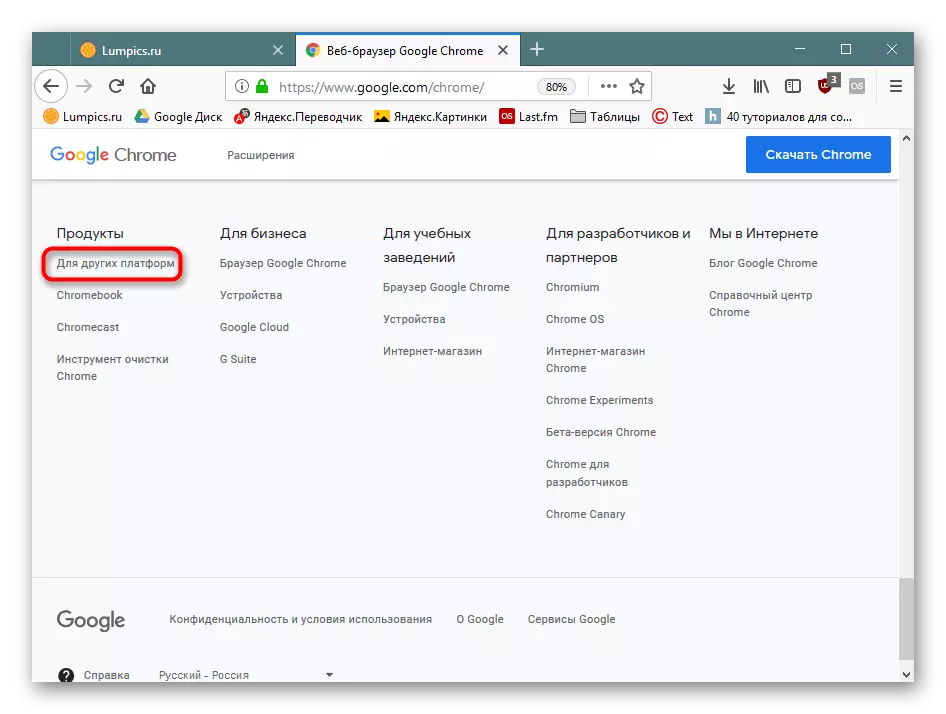
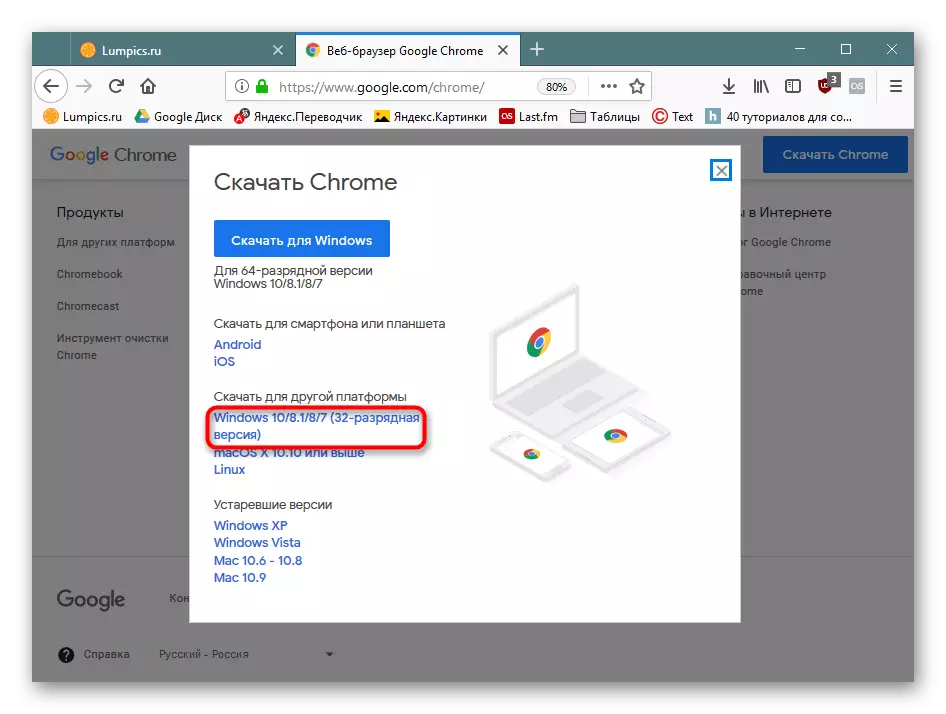
Mozilla Firefox:
- Navigate to the main page (there must be a version of the site in English) and go down down by clicking on the "Download Firefox" link.
- On the new page, find the Advanced Install Options & Other Platforms link if you want to download the version in English.
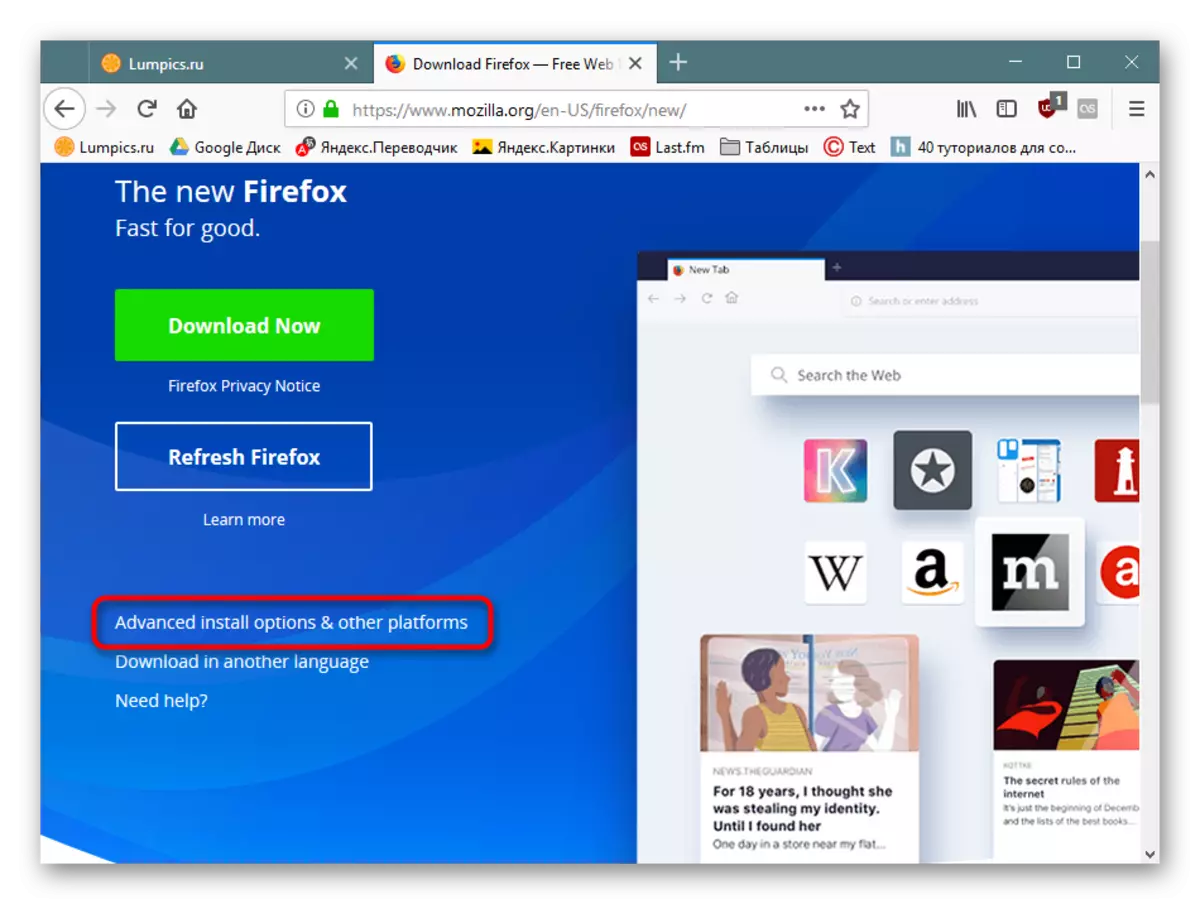
Select "Windows 32-Bit" and download.
- If you need another language, click on the link "Download in Other Language".
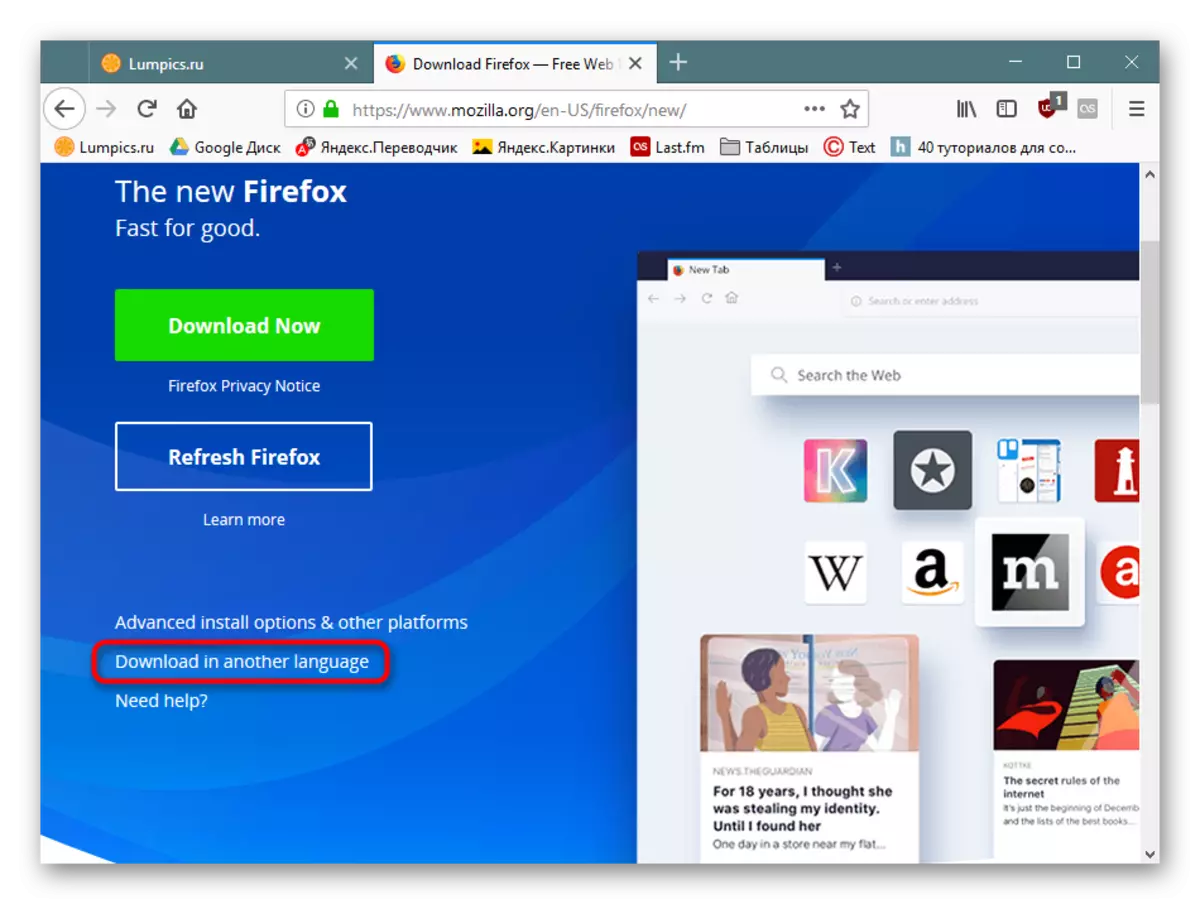
Find your language in the list and click on the icon with the inscription "32".

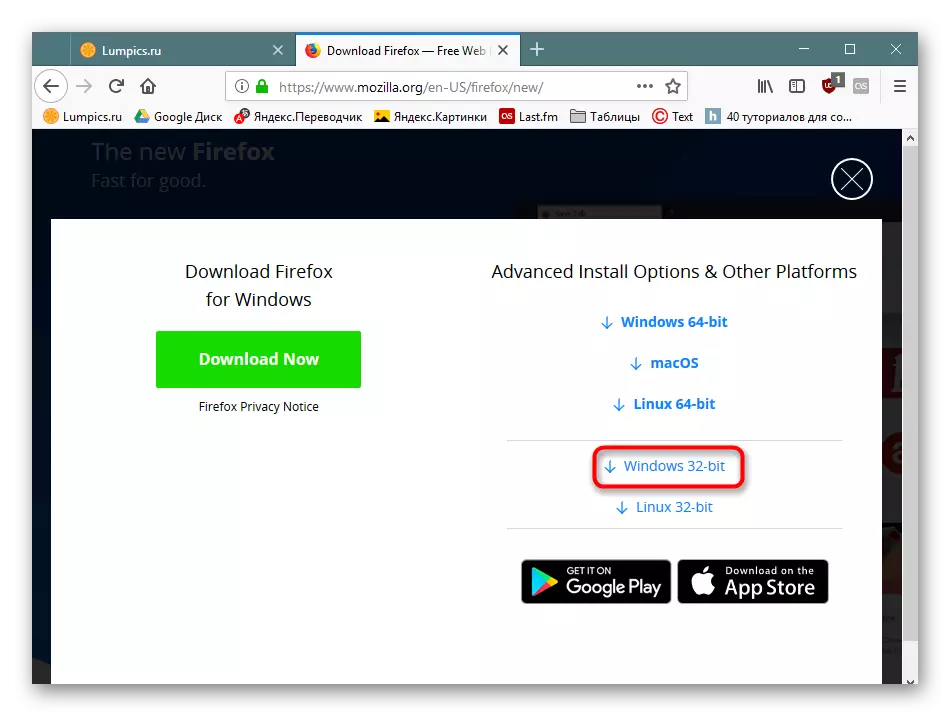
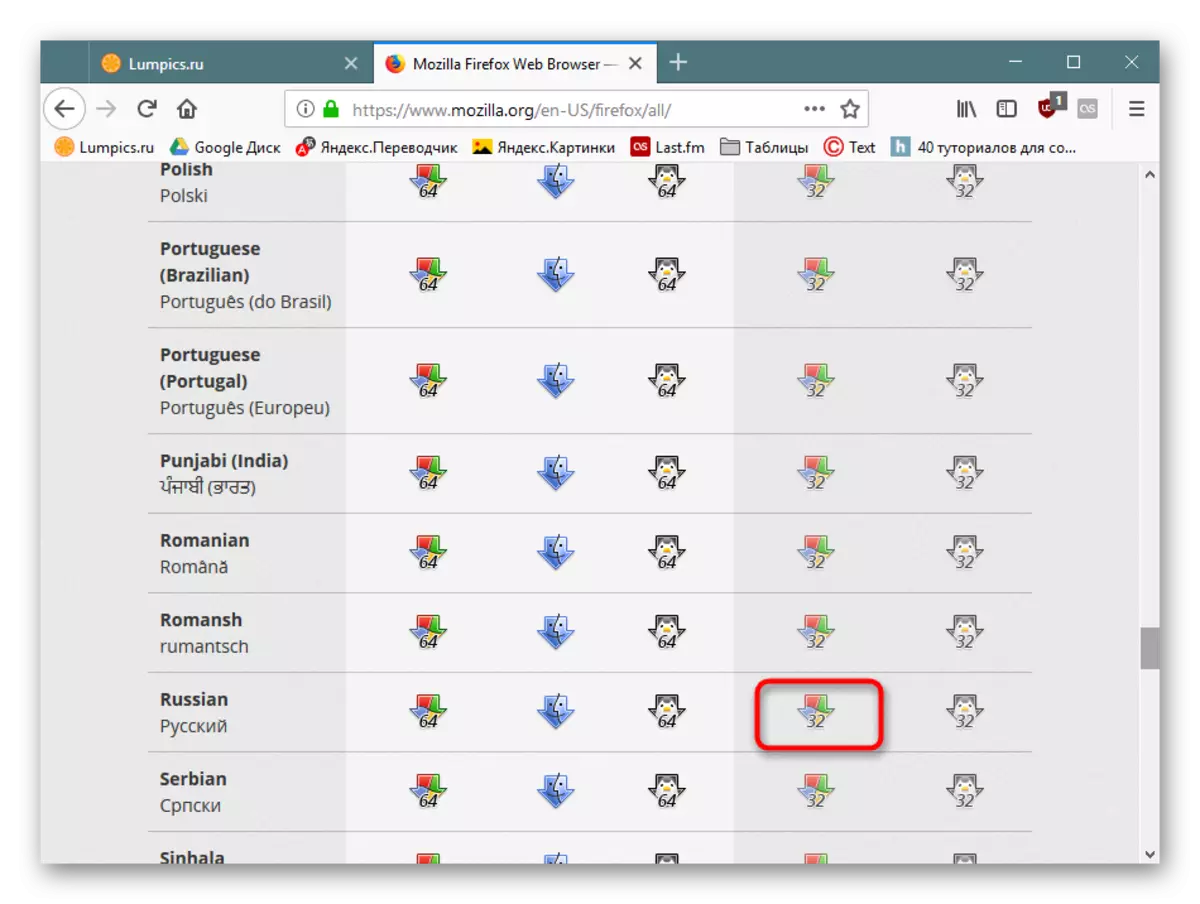
Opera:
- Open the main page of the site and click on the "Upload Opera" button in the upper right corner.
- Scroll to the bottom and in the "Archive version of Opera" block, click on the "Find FTP Archive" link.
- Select the latest available version - it is at the end of the list.
- From operating systems, specify "Win".
- Download the file "setup.exe", not having an "x64".

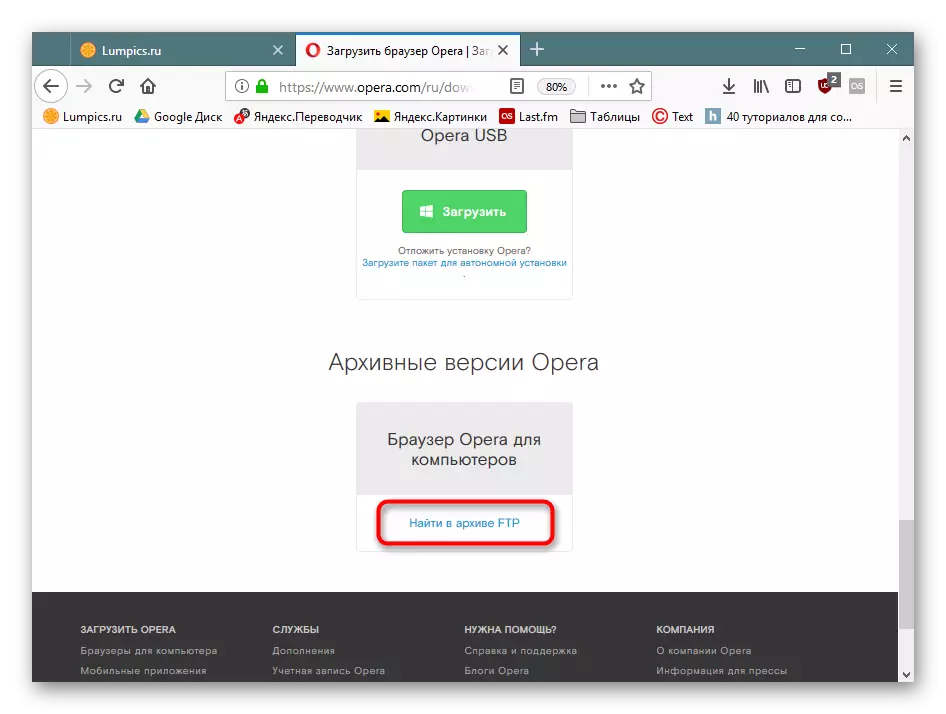
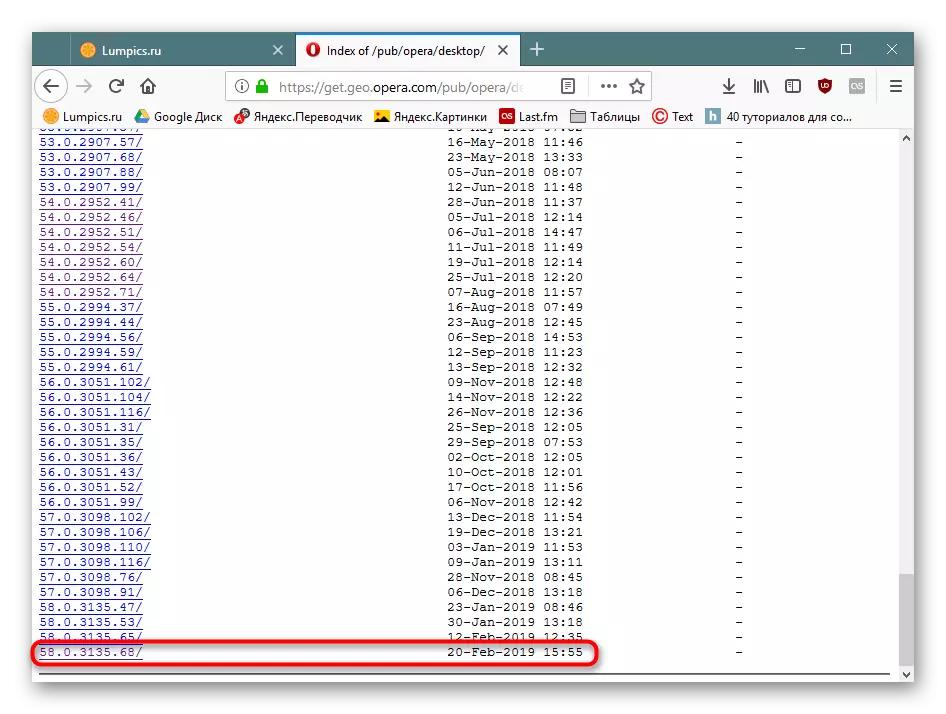
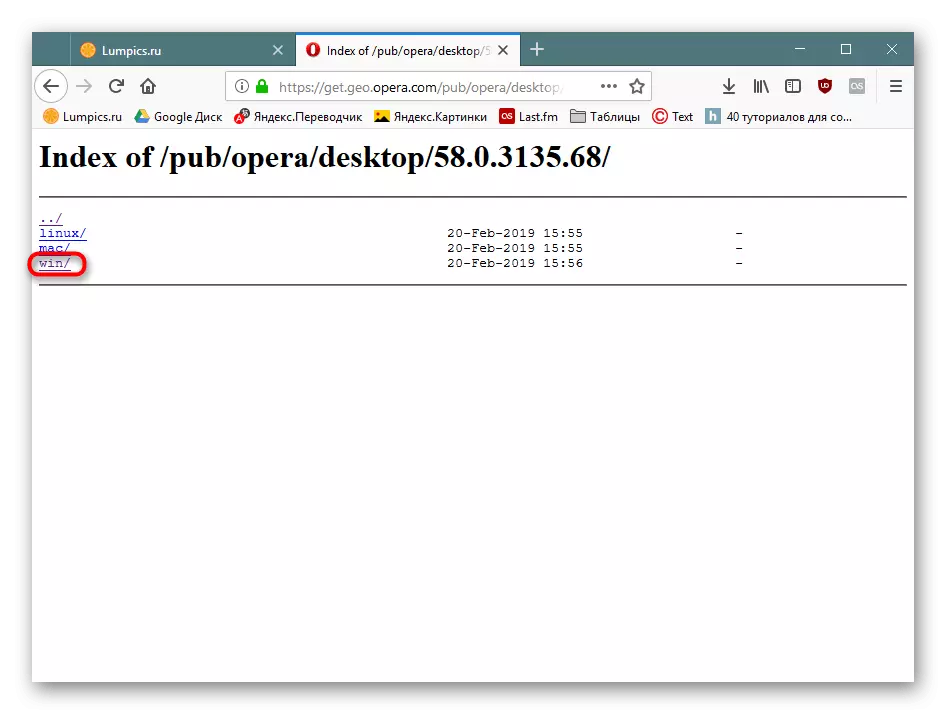
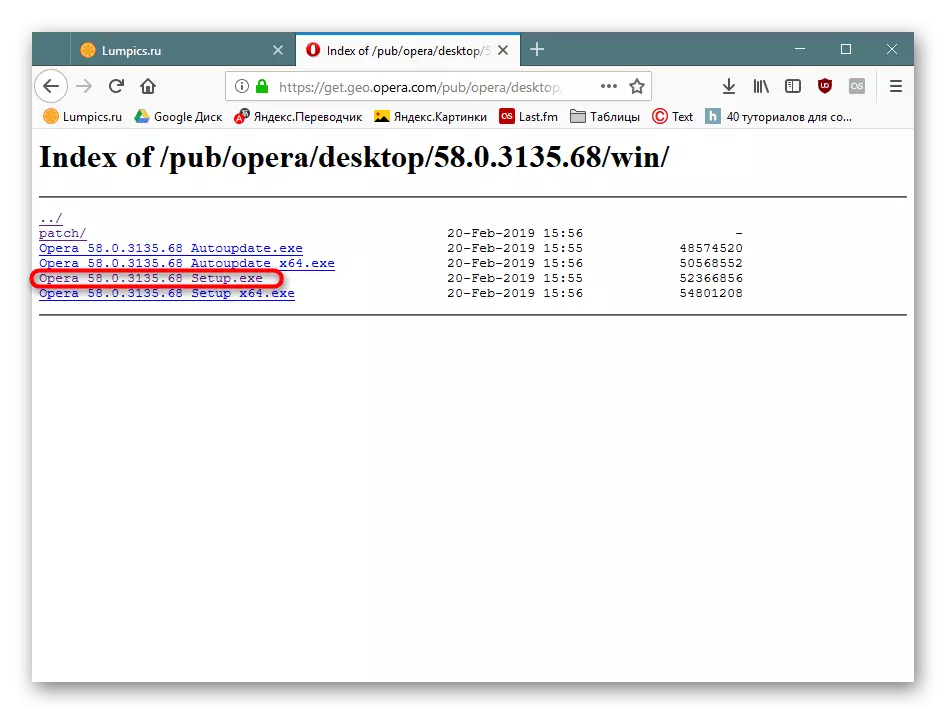
Vivaldi:
- Go to the main page, go down the page and click on the "Vivaldi for Windows" in the "VIVALDI" block.
- Scroll down the page below and in the "Download vivaldi for other operating systems" section, select 32-bit, based on the Windows version.

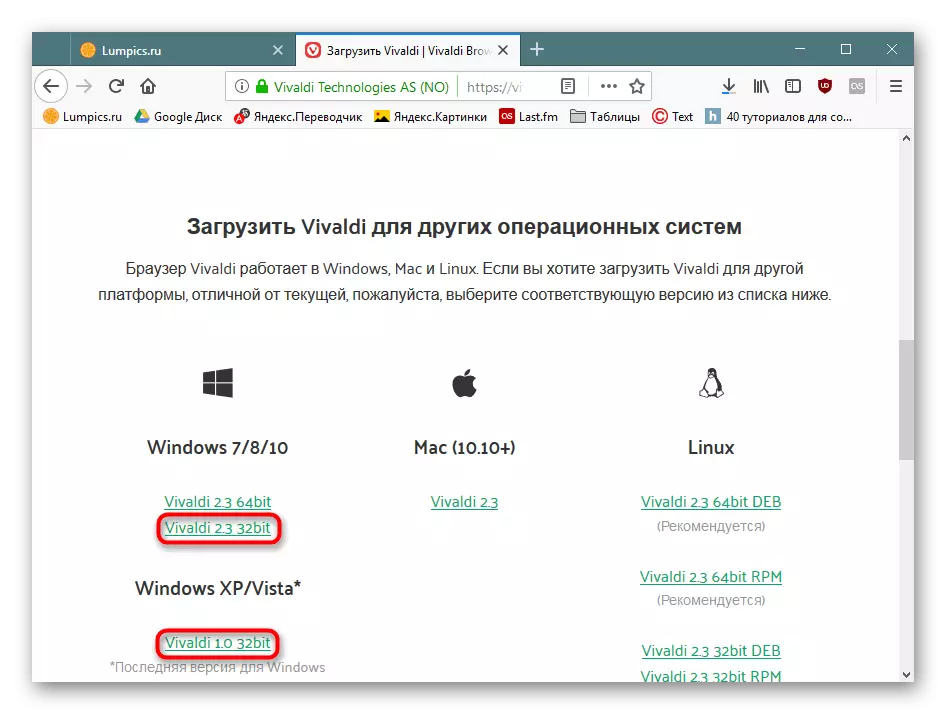
The browser can be installed on top of an already existing 64-bit or pre-deleted last version. Yandex.Browser does not provide a 32-bit version. Web browsers designed specifically for weak computers, such as Pale Moon or SlimJet, are not limited in the selection, therefore, in order to save a few megabytes, you can download a 32-bit version.
See also: What to choose a browser for a weak computer
Cause 2: Installed Extensions
Pretty obvious cause, nevertheless requiring mention. Now all browsers offer a large number of add-ons, and many of them can really be useful. However, each such extension may require both 30 MB of RAM and more than 120 MB. As you understand, it is not only in the amount of extensions, but also in their destination, functionality, complexity.
Conditional advertising blockers are a bright proof of this. All the favorite Adblock or Adblock Plus occupy much more RAM during active work than the same Ublock Origin. Check how many resources require this or that extension, you can via the task manager built into the browser. He is almost every browser:
Chromium - "Menu"> "Advanced Tools"> "Task Manager" (or press the SHIFT + ESC key combination).
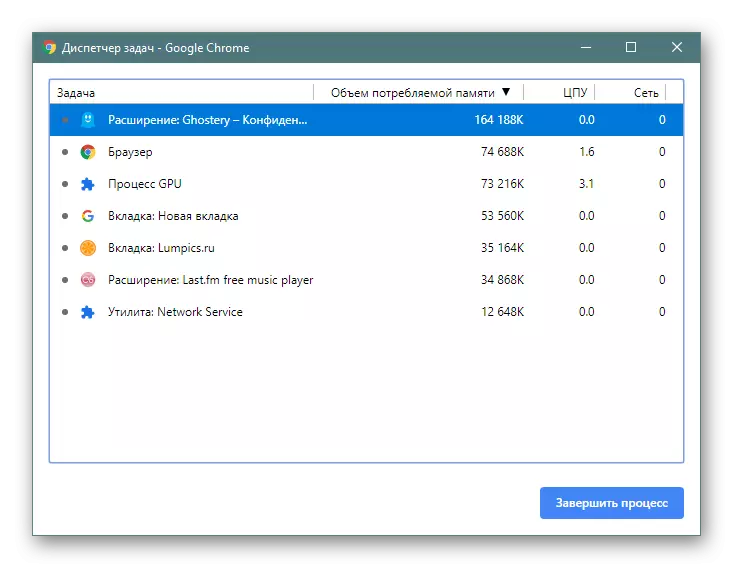
Firefox - "Menu"> "More"> "Task Manager" (or enter the About: Performance in the address bar and press ENTER).
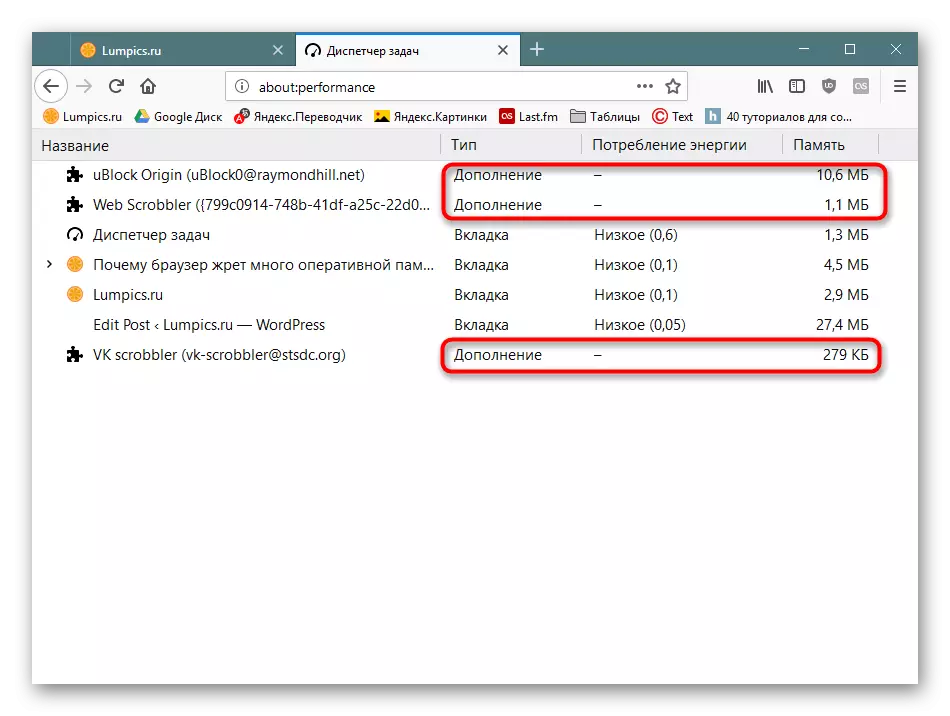
If you detect any voracious module, look for a more modest analogue, disconnect or delete.
Reason 3: Topics for registration
In general, this item follows from the second, but not all the designations that have established the topic recall that it also relates to expansion. If you want to achieve maximum performance, disconnect or delete the topic, giving the program a default appearance.Cause 4: Open tab type
In this item, you can make several points at once, which somehow affect the number of consumption of RAM:
- Many users use the attachment function of the tabs, however, they also require resources as everyone else. Moreover, since they are considered important, when starting a browser, they simplify necessarily. If possible, they should be replaced by bookmarks, opening only when necessary.
- It is important to remember and what exactly you are doing in the browser. Now many sites do not just display text and pictures, and also show video in high quality, launch audio players and other full-fledged applications that naturally require much more resources than the usual site with letters and symbols.
- Do not forget that browsers use a loading of scrollable pages in advance. For example, the VK tape does not have a transition button to other pages, so the next page is loaded even when you are on the previous one, which requires RAM. In addition, the farther down you leave, the greater the page of the page is placed in RAM. Because of this, brakes appear even in one tab.
Each of these features returns the user to "Cause 2", namely, to the recommendation, to track the task dispatcher built into the web browser - it is quite possible that a lot of memory takes 1-2 specific pages, which no longer belongs to the user and is not a wine browser.
Cause 5: Sites with JavaScript
Many sites use JavaScript scripting language for their work. In order for the parts of the Internet Page on JS correctly, the interpretation of its code is required (line-up analysis with further execution). It not only slows down the download, but also takes the RAM for processing.
Connected libraries are widely used by site developers, and they can be quite large in volume and load completely (getting, of course, in RAM), even if the functionality of the site itself does not require this.
You can fight this as a radical - disabling JavaScript in the browser settings, and easily - using the NOScript type extensions for Firefox and Scriptblock for Chromium, blocking download and operation JS, Java, Flash, but allowing them to allow them to display selectively. Below you see an example of the same site first with a disconnected scripting block, and then with the included. The cleaner the page, the smaller it loads the PC.
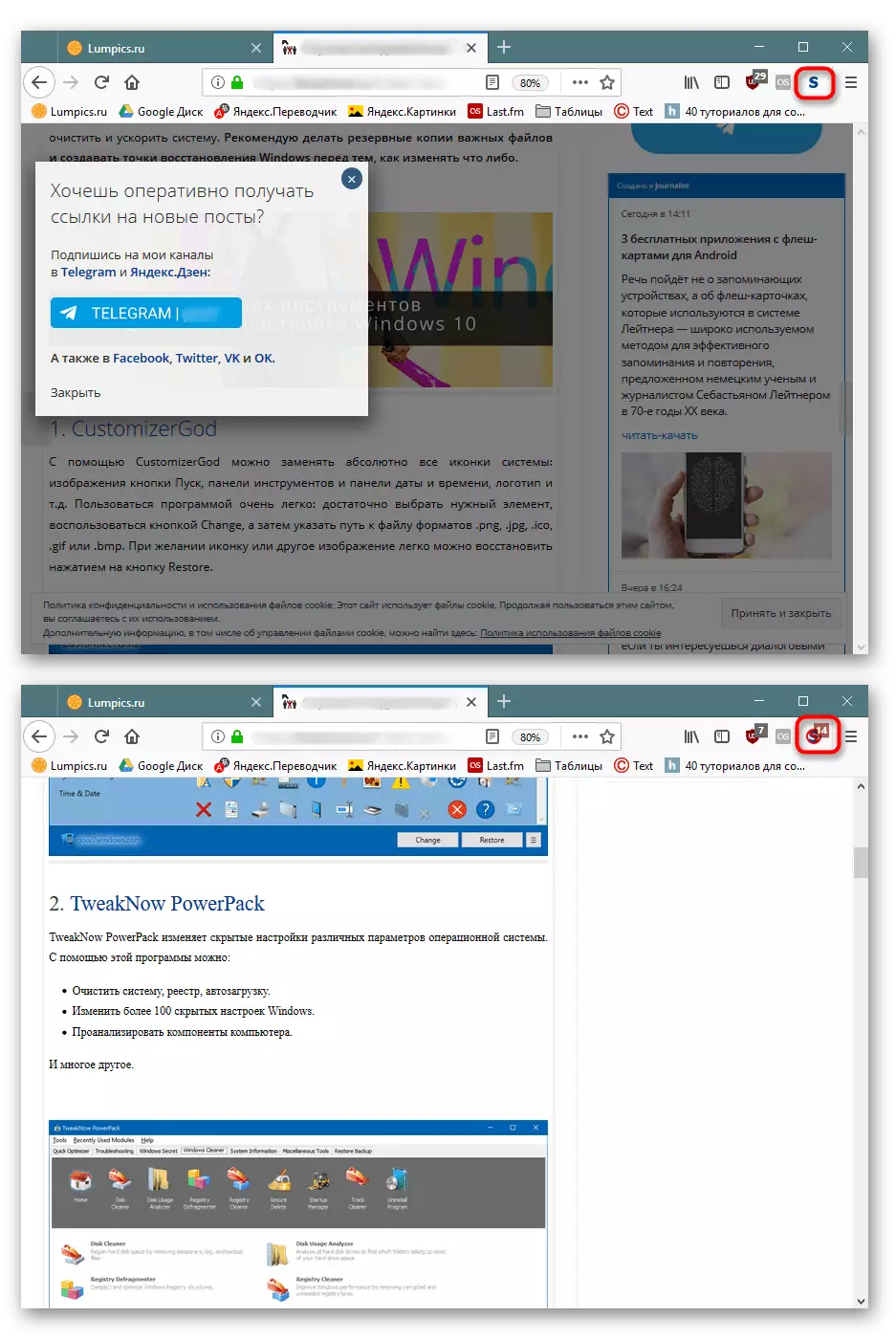
Reason 6: continuous browser work
This item follows from the previous one, but only a certain part of it. The JavaScript problem is that after completing the use of a specific script, the memory management tool in the JS called Garbage Collection is not very efficient. It does not very well affect the busy volume of RAM in a short period of time, not to mention the long-lasting time of the browser. There are other parameters that adversely affecting RAM with long-term continuous work of the browser, but we will not stop on their explanation.Check it easier to visit several sites and measuring the number of busy RAM, and then restarting the browser. Thus, 50-200 MB can be released during the session lasting several hours. If you do not restart the day browser and more, the number of already taken into memory can reach 1 GB and more.
How else to save the consumption of RAM
Above we listed not only 6 reasons that affect the number of free RAM, but also told how to fix them. However, there are not always enough of these tips and additional options for solving the question under consideration are required.
Using a browser unloading background tabs
Many popular browsers are now quite voracious, and as we have already understood, it is not always a browser engine and user actions. The pages themselves are often overloaded with content, and remaining in the background, continue to consume RAM resources. To unload them, you can use browsers that support this feature.
For example, VIVALDI is similar - it is enough to press the PCM on the tab and select the "Unload Background tabs" item, after which they all except active will be unloaded from RAM.
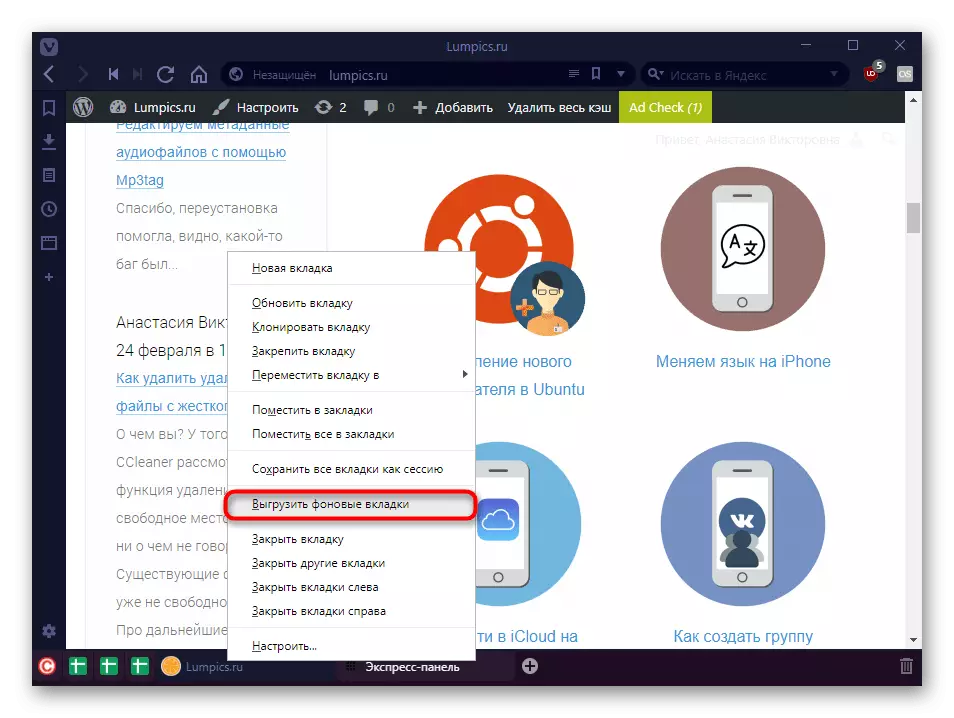
In SlimJet, the autvelop feature of the tab is customizable - you need to specify the number of idle tabs and time, after which the browser will unload them from RAM. More information about this is written in our browser review on this link.
Yandex.Browser has recently added the Hibernate feature, which like the function of the same name in Windows unloads data from RAM to the hard disk. In this situation, the tabs that have not been used for a certain time, go to hibernation mode, freeing up RAM. When you retreat to the downloaded tab, the copy is taken from the drive, saving its session, for example, a text set. Saving a session is an important advantage over forced unloading tabs from RAM, where all the progress of the site is reset.
Read more: Hibernate technology in Yandex.Browser
In addition, I. Baurazer has a function of intelligent page load when starting the program: When you run the browser with the last saved session, the tabs that were fixed and the usual frequently used sessions are loaded and fall into RAM. Less popular tabs are loaded only when accessing them.
Read more: Intelligent Loading tabs in Yandex.Browser
Setting the extension to manage tabs
When the browser is not able to overcome, but I also don't want to use absolutely light and unpopular browsers, you can set an extension that controls the activity of background tabs. Similarly implemented in browsers, about which it was a little higher, but if they are not suitable for you for some reason, it is proposed to make a choice in favor of third-party software.
In the cancer of this article, we will not paint instructions on the use of such extensions, because even a beginner user can understand their work. Also, leave the choice of you, listened to the most popular software solutions:
- ONETAB - When you press the extension button, all open tabs are closed, only one thing remains through which you will manually re-open each site as needed. This is an easy way to quickly release RAM without losing the current session.
Download from Google WebStore | Firefox Add-Ons
- The Great Suspender - Unlike ONETAB, the tabs are not placed here in one, but simply unloaded from RAM. This can be done manually by clicking on the extension button, or configure the timer, after which the tabs will automatically be unloaded from RAM. At the same time, they will continue to be in the list of open tabs, but upon subsequent appeal to them will be rebooted, again, starting to take PC resources again.
Download from Google WebStore | Firefox Add-ONS (Tab Suspender Extension Based on The Great Suspender)
- TabmemFree - automatically unloads unused background tabs, but if they were fixed, the extension bypasses them. This option is suitable for background players or open text editors online.
Download from Google WebStore
- Tab Wrangler is a functional expansion that assembled all the best of the previous ones. Here the user can configure not only the time after which the open tabs are unloaded from memory, but also their number in which the rule will begin to act. If specific pages or pages of a particular site do not need to be processed, you can apply to the White List.
Download from Google WebStore | Firefox Add-Ons
Configuring browser
In the standard settings, there are practically no parameters that could affect the consumption of RAM browser. Nevertheless, one base opportunity is still present.
For chromium:
The possibilities of fine tuning from browsers on Chromium limited, but the set of functions depends on the specific web browser. In most cases, you can only disable the pre-renderinger. The parameter is in "Settings"> "Privacy and Security"> "Use Tips to accelerate page download".

For Firefox:
Go to "Settings"> General. Layout the "Performance" block and place it or remove the checkbox from the "Use recommended performance settings" item. If you take a tick, the additional 2 items on the performance setting will open. You can turn off the hardware acceleration if the video card does not very correctly processes the data, and / or configure the "maximum number of content processes" directly affecting RAM. More detailed about this setting is written on a Russian-speaking Mozilla support page, where you can get by clicking on the link "More details".

To disable the acceleration of page loading like that was described above for Chromium, you will need to edit experimental settings. This is written below.
By the way, Firefox has the ability to minizimize the consumption of RAM, but only within a single session. This is a one-time solution that can be used in conditions of strong consumption of RAM resources. Enter into the address bar About: Memory, find and click on the "Minimize Memory Usage" button.
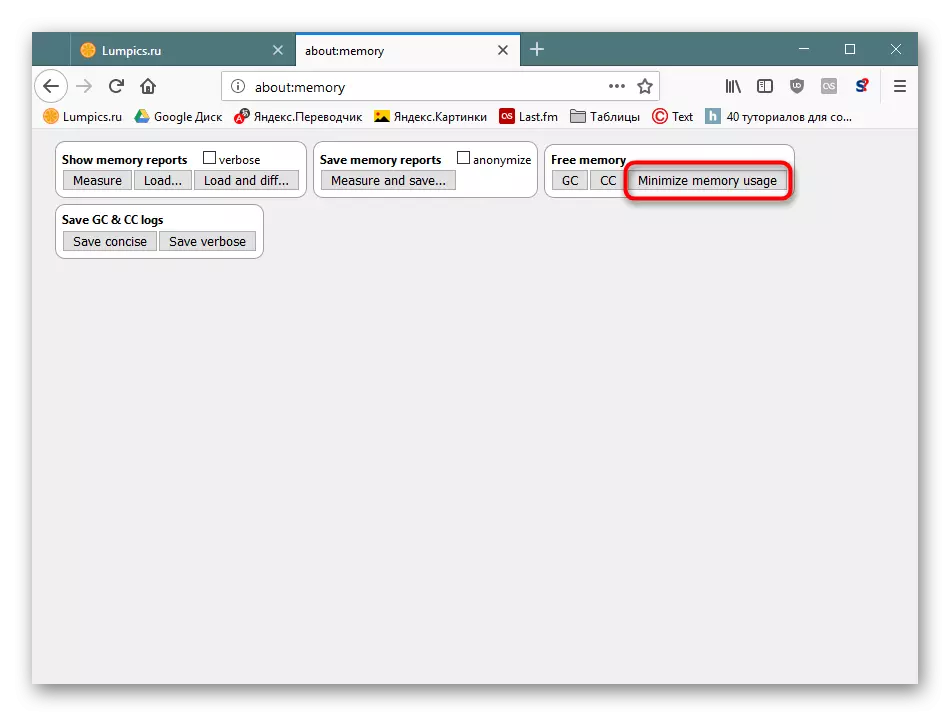
Use experimental settings
In browsers on the Chromium engine (and its forcing Blink), as well as in those using the Firefox engine, there are pages with hidden settings that may affect the number of RAM allocated. Immediately it is worth noting that this method is more auxiliary, so it is not necessary to fully rely on it.
For chromium:
Enter the Chrome: // Flags address string, Yandex.Braser users need to enter Browser: // Flags and press ENTER.

Insert the following item in the search field and click on ENTER:
# Automatic-Tab-Discarding - automatic unloading of tabs from RAM if there are little free RAM in the system. When re-accessing the unloaded tab, it will be first rebooted. Set it the value "Enabled" and restart the browser.
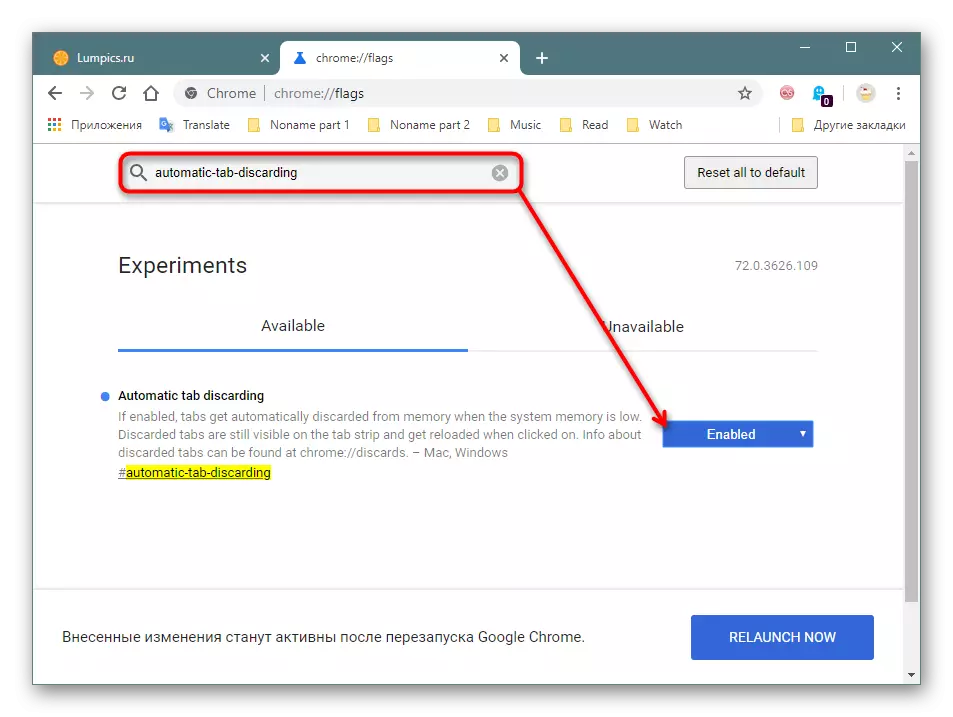
By the way, by going to Chrome: // Discards (or Browser: // Discards), you can view the list of open tabs in the order of their priority, a specific browser, and manage their activity.
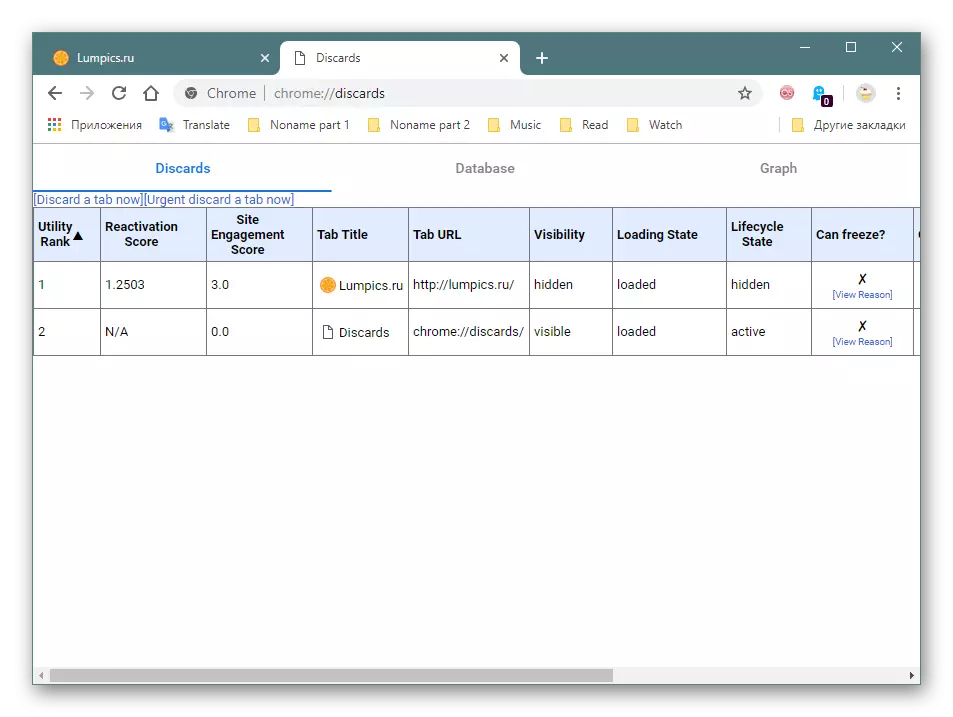
For Firefox features more:
Enter the Add: Config to the address field and click "I take the risk!".

Insert the commands that you want to change the search line. Each of them directly or indirectly affects RAM. To change the value, click on the LKM parameter 2 times or PCM> "Switch":
- Browser.sessionHistory.max_total_Viewers - regulates the number of RAM, which is highlighted on the visited pages. The default is used to quickly display the page when you return to the "Back" button instead of reloading. In order to save resources, this parameter should be changed. Double click LKM, ask him the value "0".
- config.trim_on_minimize - unloads the browser to the paging file, while it is in the rolled state.
By default, the command is not in the list, so creating it yourself. To do this, click on the empty place of PCM, select "Create"> "String".
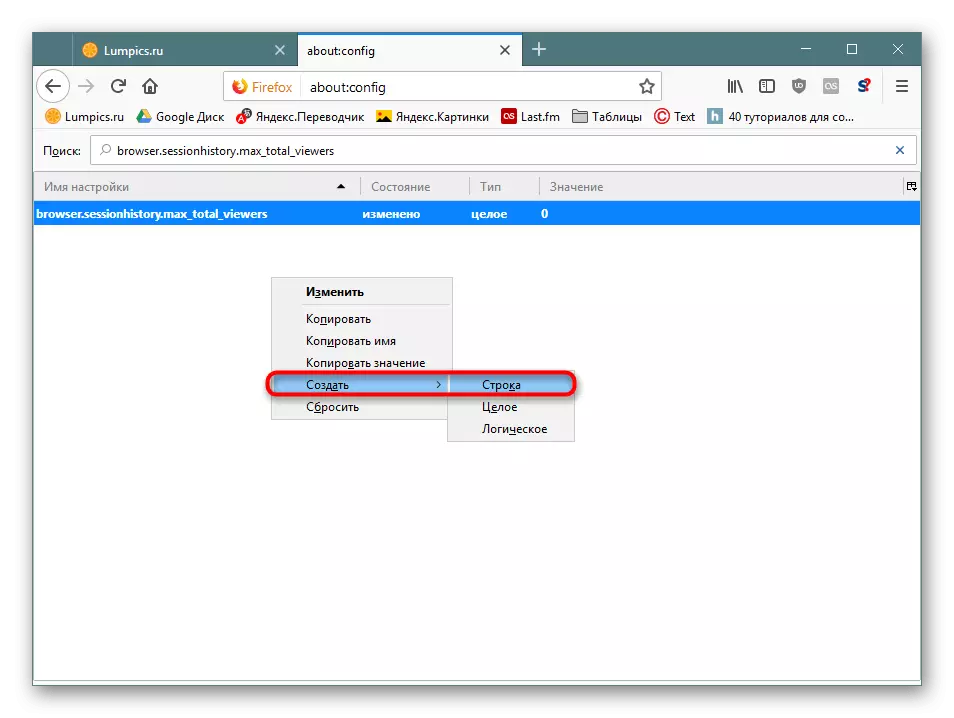
Enter the name of the command specified above, and in the "True" field in the "True" field.
- Browser.cache.Memory.Enable - Allows or prohibits cache stored in RAM within a session. It is not recommended to disable, as this will reduce the page loading speed, since the cache will be stored on the hard disk, significantly inferior in the RAM speed. The value "True" (default) allows if you want to disable - specify the "false" value. To work this setting, be sure to activate the following:
Browser.cache.disk.enable - places a browser cache on a hard disk. The value "True" allows the storage of the cache and allows the previous configuration to function correctly.
You can configure other commands. browser.cache. , for example, specifying the place where the cache is saved on the hard disk instead of RAM, etc.
- browser.sessionsstore.restore_pinned_tabs_on_demand - set the value "True" to disable the ability to download fixed tabs when you start the browser. They will not be downloaded in the background and consume a lot of RAM as long as you go to them.
- Network.Prefetch-Next - Disables the preset page. This is the most preread that analyzes the links and the predictive, where you will go. Set it the value "false" to disable this feature.
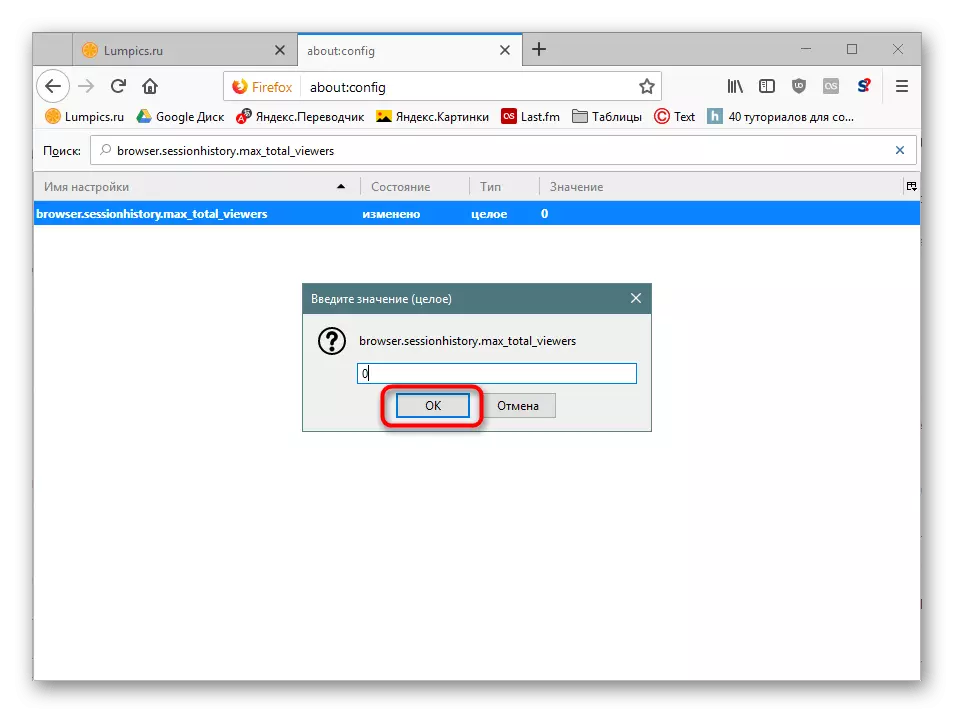
See also:
How to Resize Paddock File in Windows XP / Windows 7 / Windows 8 / Windows 10
Defining the optimal size of the paging file in Windows
Do you need a paging file on SSD
Setting up experimental functions was possible and continued because Firefox has many other parameters, but they affect RAM much less than those listed above. After changing the parameters, do not forget to restart the web browser.
We disassemble not only the reasons for high-consumption by a browser RAM, but also different ways and efficiency ways to reduce RAM resource consumption.
